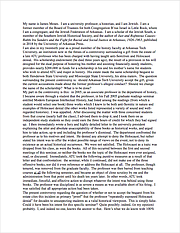RUSSELLVILLE -- A World War II veteran who helped liberate a Nazi concentration camp joined Arkansas Tech University students at a rally Tuesday to protest a scholarship honoring a former professor accused of anti-Semitism.
A couple of dozen students, some carrying signs such as "We will not be silent" stood inside the university's Hindman Bell Tower while more than 100 students and others stood nearby.
The peaceful protest came less than two weeks after the Anti-Defamation League's chief executive and other Jewish organizations, along with national and international scholars, criticized the university for the scholarship honoring the late Michael Link, who they said was a Holocaust denier and anti-Semitic. Link died in 2016.
Wearing a World War II cap, Beryl Wolfson, 96, of Hagarville sat in a wheelchair beside his wife, Esther, and the students and recalled helping liberate the Dachau concentration camp in Germany in 1945.
Wounded twice while serving in the Army, Wolfson, who is Jewish, said his worst memory was finding bodies stacked on top of one another in a boxcar -- "women, men and children, some of them babies. ... I thought they were alive, but they were all dead" from the cold and starvation after their train ran out of coal, he said.
Later Tuesday, the university released the letter of another Arkansas Tech history professor, James Moses, who said he is Jewish and had spoken in favor of removing Link's name from the scholarship. But Moses also defended the university's actions in his Friday letter as he detailed disciplinary actions taken against Link in 2005 over an incident involving anti-Semitic literature.
University spokesman Sam Strasner released the four-page letter, written to university President Robin Bowen and Jeff Woods, dean of College of Arts and Humanities, with Moses' permission but said he did not have access to any information confirming or denying the disciplinary information in it.
The letter offers details of how the university disciplined Link after an event in 2005. The letter does not refer to Link by name until its final paragraph when it says in part: "ATU is not Dr. Link, and Dr. Link is not us. We do not honor him. The values and beliefs ascribed to him are the very things we as an institution stand forthrightly against."
Moses' letter notes that his colleague's estate also made scholarship bequests to Henderson State University, Link's alma mater, and Mississippi State University.
Moses wrote that he was "appalled" in 2005 when he learned that his fellow professor had listed "three works which I knew to be both anti-Semitic in nature and examples of Holocaust denial" as among those works that students were to select for one reading. Link also had offered other works that Moses said "represented a variety of sound and well-regarded histories."
After talking with "three concerned students," Moses said he advised them to drop the seminar and took them on as independent-study students.
"I then wrote a fiery and highly detailed letter to the university president [then Robert Brown] explaining the utter and absolute unacceptability of those books as historical works, and urged him to take action, up to and including the professor's dismissal," Moses wrote.
Moses said his colleague "denied any attempt to deny the Holocaust, but rather stated his intent was to offer the widest possible range of views on the event. ... We were not satisfied. The Holocaust as a topic was dropped from his class, as were the books. All of this occurred between the first and second meetings of this seminar, so neither the books nor the topic of the Holocaust were ever assigned, read, or discussed."
Moses said "punitive measures" taken against the tenured professor included not allowing him to use the readings at issue or to address the Holocaust at all during the seminar and removing him from the graduate faculty.
"The professor was then barred from teaching courses at all the following semester, and became an object of close scrutiny by me and the administration from that point until his death," Moses wrote.
Moses said he was "hyper-vigilant in trying to 'catch' the professor ... espousing or manifesting any anti-Semitism or Holocaust denial" after 2005. "I never heard anything along those lines."
Moses said he "spoke in favor of having the professor's name removed from the scholarship, but the university cannot do that without the permission of the estate. We cannot act unilaterally. It is, therefore, all or nothing.
"I do not defend the man. Far from it. I defend my university and my department against charges of inaction, ignorance, and dereliction of duty," said Moses, who was recently interviewed by The Arka Tech student newspaper.
"I protest the wholly inaccurate portrayal of ATU as having harbored a known and habitual Holocaust denier for decades. This is simply untrue," he added.
The university "may well reject the scholarship endowment," he wrote. But he said the scholarship money could "be a force for good" by helping financially needy students study history, including the Holocaust.
The protest became tense when a young man who called himself a "white nationalist survivalist" and who wore a T-shirt saying, "Death to all Christ killers," showed up. Defending the scholarship, he later said he was a white supremacist and said his T-shirt was referring to Jews, including those living today.
State Desk on 05/01/2019
